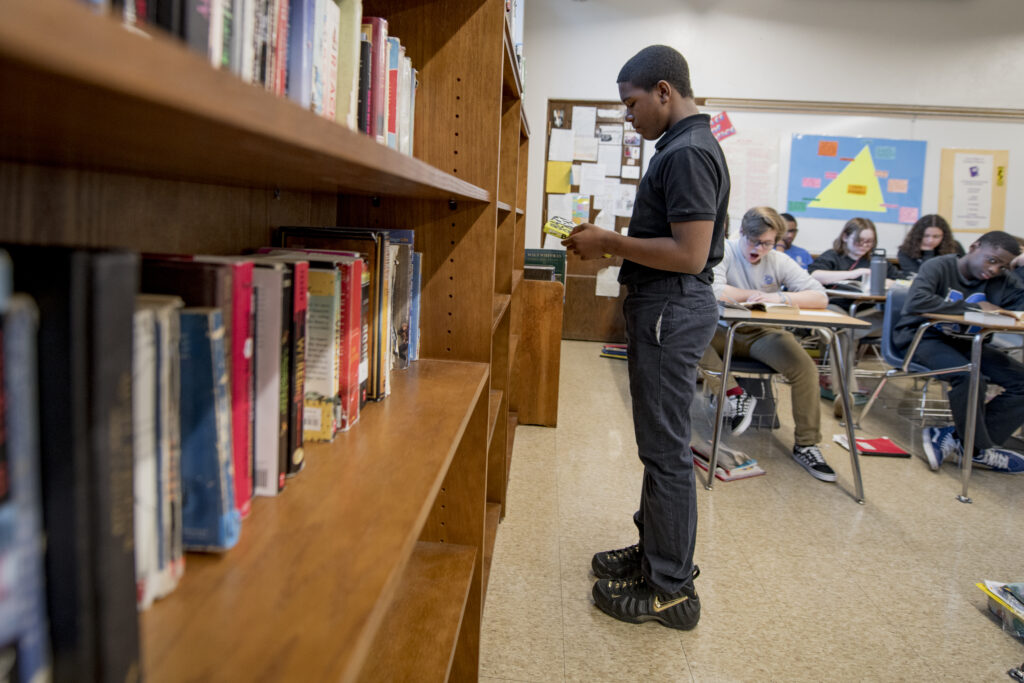This post was written by NCTE member Jason D. DeHart.
In 1999, I was an uncertain teenager who was doing his best to navigate the questions of life, changes at home, and finding a place. My AP English teacher saw potential in me and challenged me to keep reading and writing. I remember perusing the names on the AP reading list and discovering books by the authors on that list whenever I could. I scanned their words to check off my AP list but did not pause to reflect much on their identities and positionalities in terms of gender and race. As you might imagine, the majority of those authors were white and male.
Flash forward to 2023, and I am now teaching an AP course of my own, carrying memories of my experiences with me. In spite of years of reading stories from historically minoritized writers, I have found myself once more in the crux of the pressure to honor the classics and hold up the canon, while at the same time recognizing that my students continue to express a stronger connection to contemporary voices from a range of cultural backgrounds. I have even revisited some of those classic works with adult eyes and see them in new and more critical ways.
I have wrestled with the notion of exposing my students to voices from the past, while recognizing that many of those voices are hurtful in terms of the language they chose to use about women and people of color. It is all too easy to talk on the surface about the importance of equity-focused instruction; this post is a call to testing companies, textbook companies, and assessment creators to consider the ways that the classics continue to be centered in instructional materials. The reconsideration of testing practices altogether would be altering at the system level, but beginning with a consistent thread of equity-focused and culturally responsive assessment materials would be a (hopefully) positive step.
In this post, I share a few ideas for framing canonical and contemporary voices in light of the demands of curriculum.
Complex Moves in Contemporary Literature
Appreciating literature is also not a process solely rooted in the past. Recently, my students had the chance to listen to Jason Reynolds perform For Every One, and we read his story, “Eraser Tattoo.” Plot, style, theme, and more can be found in these works. We then took a trip through early American literature and discussed my students’ American stories. My students are willing to patiently endure a variety of reading texts. At the same time, I continue to reflect on the ways that there is simply enough hurt in the world without exposing my students to more of the same in a place that should feel safe and welcoming.
Even if assessments students may encounter do not position contemporary voices as readily, bringing these works into my classroom and pointing out the “literary goodness” they offer enlivens my work.
Classics as Part of the Conversation
Do we erase the classics? I do not believe so. Our class also recently read “Dear Dr. Frankenstein” by Jericho Brown. We talked about the story of Adam and Eve, referenced in this work, and my students commented on the more familiar language, even as we grappled with literary themes and meaning. Brown’s discussion of the act of naming and the notion of belonging led to conversations about how America came to be in its early days, and how everything we build is not an indication of ownership. We can then link to the words of Walt Whitman, taking a critical look at the kind of world that authors chronicled centuries ago.
Seeing these thematic links, while honestly and critically recognizing problematic views expressed in some works, is the kind of evaluative thinking we want students to engage with.
Writing Our Own Stories
The work of storytelling is also not relegated to consuming the writings of others. My summative question as we explored voices, both from decades past and moments ago, was: What was the message American authors were sending? Students responded in writing and discussion, noting how writers wanted to get away, celebrate nature, push back on slavery, explore the meaning of freedom, and more. While I prepare my students for academic essays, I embrace Kelly Gallagher and Penny Kittle’s note in the book 180 Days: Two Teachers and the Quest to Engage and Empower Adolescents that literacy be a living practice. To read poetry without providing an invitation to respond in this form would seem disconnected and inauthentic in my desire to share connected experiences. I attempt to engage all avenues of expression with my students, including narrative, essay forms, verse, and more.
I then asked: What is your message for/about America now? From the traditional canon and new, celebrated voices, my students reflected and responded, talking about the social and even political landscape they encounter each day. In my students’ prose and poetic responses, I noted that the story of America is still thrumming and is still in development. It can be found in moments when my students are exposed to authors from a past that feels like another world, and when my students meet a contemporary voice who is sometimes talking about a similar desire to pull away and explore life for themselves.
Literacy does not stop at reading—rather, writing and composing are mainstays as we envision ways to make stories relevant.
Locating New Muses
As we work to share our voices, teachers might examine how poems of activism can then be reimagined as video texts, in the same way that George Ella Lyon’s “Where I’m From” has been rendered as an inspiring and haunting digital production. Without prompting or a poetic pre-lesson, my students composed with powerful words, including alliteration, metaphor, and insights into the feelings of their age.
They are, after all, the authors who are most tapped into the voices who engage them every day on social media in written and video forms, and my students have the voices that find new ways to communicate their values and engage in artivism/activism, sometimes starting with the stories that keep getting passed down, while also locating new muses.

Jason D. DeHart is a passionate educator, currently teaching English at Central Wilkes High School in Wilkesboro, North Carolina. He served as a middle grades English teacher for eight years and an assistant professor of reading education at Appalachian State University from 2019 to 2022. DeHart reviews books and interviews authors at his website, Book Love: Dr. J. Reads.
It is the policy of NCTE in all publications, including the Literacy & NCTE blog, to provide a forum for the open discussion of ideas concerning the content and the teaching of English and the language arts. Publicity accorded to any particular point of view does not imply endorsement by the Executive Committee, the Board of Directors, the staff, or the membership at large, except in announcements of policy, where such endorsement is clearly specified.


